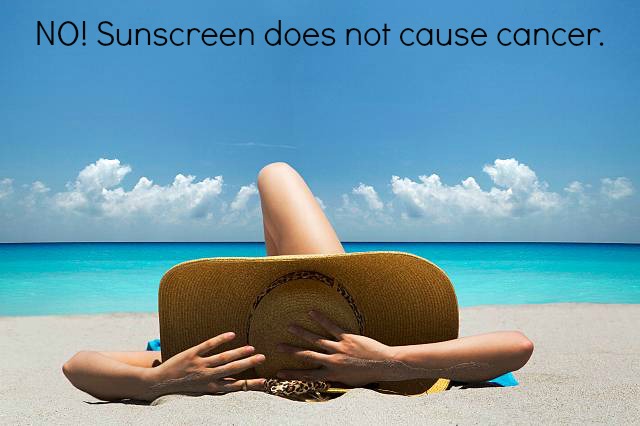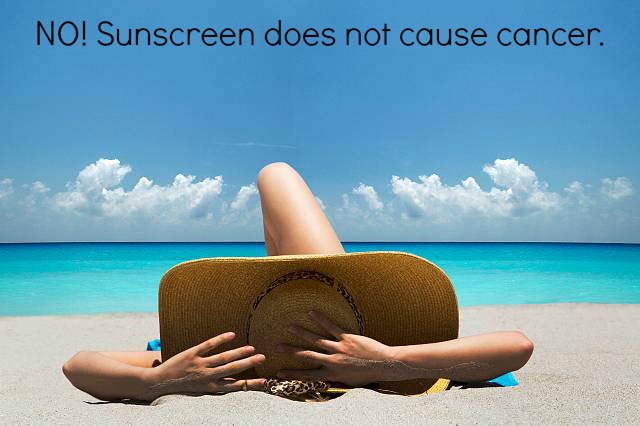

So, an article from RealFarmacy.com (RF) appeared this week claiming that scientists have “blown the lid on the cancer and sunscreen myth” – whatever that means. Somehow, through an extensive and interesting use of confirmation bias and cherry picking, this article managed to string together the preposterous argument that sunscreen is, more or less, a myth and you shouldn’t use it. They go as far as to say that sunscreen actually causes cancer. Unfortunately, this article has gone viral, so we’re going to address some of the bigger issues seen here.
Firs thing first, our skin already helps to protect us against the sun. Clothing also helps, but sometimes in the summer heat we live to leave some, or much, of our skin exposed to the Sun. A little sun is a good thing, it allows lighter people produce vitamin D, which is important. Too much sun is bad because the ultraviolet light likes to wreak havoc on our DNA (this is where cancer comes in). This is where the debunking comes in…
RF Claim #1: “A study shows that women who limit Sun exposure are twice as likely to die from causes related to vitamin D deficiency.”
Here, the RF article references a study performed in Sweden titled “Avoidance of sun exposure is a risk factor for all-cause mortality.” Here, a team of researchers studied around 30,000 women and their sunbathing habits for 20 years. Overall, the study was reputable and found that women who avoided the sun, or got minimal exposure to the sun, were much more likely to die than those women who spent some time basking in the Sun’s glow. The paper also listed two causes of death, melanoma or “all-cause morality” (which is basically the category for “everything else”). The paper did not say the women died from vitamin D deficiency nor did the paper have anything to say about sunscreen whatsoever.

RF Claim #2: “There is no evidence that sunburns cause melanoma, and people who use sunscreen are MORE likely to get melanoma than those that don’t.”
So, first a little science about melanoma. There are different types of melanoma, but we’re concerned with the kind that is more likely to develop with help from the sun. Specifically, scientists have discovered that UVA and UVB rays probably increase the chance that someone will develop certain kinds of melanoma.
In a study conducted in the mid-1990s, another Swedish research team studied about 1500 people, how much sunscreen they used, and how much sun exposure they got (all over a span of two years). The study did find the correlation that people who used sunscreen were more likely to develop melanoma. However, the study also found that the average SPF (sun protection factor) was 6. For the record, the CDC recommends a SPF of at least 15. Likewise, people who used sunscreen (at all) were much more likely to spend a lot more of their time outside. It’s basically a classic correlation does not equal causation thing. “Ice cream sales rise in the summer. The drowning rate also raises in the summer. Ergo, ice cream causes drowning.” No, ice cream doesn’t cause drowning, in the summer you’re more likely to be outside. Putting on sunscreen doesn’t cause melanoma, putting on sun screen means you intend to spend lots of time outside.
RF Claim #3: “Eliminating exposure to sunlight has created epidemic vitamin D deficiencies.”
This portion of the RF article probably has the most truth to it, though it is buried in misinformation. Eliminating exposure to sunlight is very bad. Without it, we tend to develop vitamin D deficiencies and that has been shown to affect our bone health, blood pressure, heats, cause cancers, and more. For the most part, it’s recommended that you get about 20 minutes of sunlight every day.
Sunscreen is designed to block the UV light that helps us synthesize vitamin D. If you put on the most incredibly precise coat of sunscreen on everyday, waited half an hour (or whatever the recommended time is) to go outside, then proceeded to spend the rest of your day either hiding from the sun or reapplying your sunscreen at the recommended times, you will develop a vitamin D deficiency. Then again, as I mentioned earlier, people usually don’t put on sunscreen unless they plan to spend a lot of time outside. Spending all day at the beach without sunscreen isn’t a very good idea. Putting on sunscreen to go to the mailbox isn’t a good idea either. This falls under the area of “use common sense.”
As a side note, the sun isn’t the only place we get vitamin D from. We also can get it from food, such as types of fortified milk, eggs, some types of fish, and the list goes on.

RF Claim #3: “Sunscreens contain endocrine disrupting chemicals (EDCs) that stay in the body and can cause cancer and harm the environment.”
Pretty much everyone here likes the environment and not getting cancer. There is a fringe set of believers who claim that oxybenzone (a common ingredient found in sunscreen that blocks most of the bad UV rays) is absorbed into the body, acts like estrogen, and increases the risk that someone will develop skin cancer. This, as far as I can determine, is completely made up since there haven’t been any studies that actually attempt to claim this (even in studies where subjects are given doses much higher than what you’d get from sunscreen). On the same vain, the CDC has found that oxybenzone can be found in the blood stream of about 97% of Americans, though the article failed to mention that it’s found only in trace amounts and (again) hasn’t been shown to be harmful.
As for the environment, we have yet to find any indication that it actually poses a risk to marien life. That being said, any time we are introducing a foreign substance into an ecosystem, we get a little concerned and try to stop that from happening. Even then, things like birth control have actually been shown to be harmful to marine life, so maybe we should address that issue (note: I’m not saying don’t use birth control, lets just focus our energy on solving actual problems).
Lastly, there are a number of sunscreens that don’t even use oxybenzone, so even if you wanted to avoid that substance, you don’t have to go sunscreen-free.
The moral of the story, Google first, check the facts, use common sense, and please (please) use sunscreen when you want to hang out all day in this delightful weather.